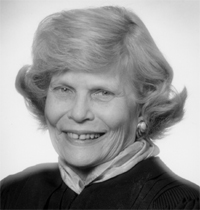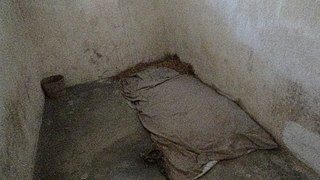
In the United States, the Miranda warning is a type of notification customarily given by police to criminal suspects in police custody advising them of their right to silence and, in effect, protection from self-incrimination; that is, their right to refuse to answer questions or provide information to law enforcement or other officials. These rights are often referred to as Miranda rights. The purpose of such notification is to preserve the admissibility of their statements made during custodial interrogation in later criminal proceedings. The idea came from law professor Yale Kamisar, who subsequently was dubbed "The father of Miranda."
Rasul v. Bush, 542 U.S. 466 (2004), was a landmark decision of the United States Supreme Court in which the Court held that foreign nationals held in the Guantanamo Bay detention camp could petition federal courts for writs of habeas corpus to review the legality of their detention. The Court's 6–3 judgment on June 28, 2004, reversed a D.C. Circuit decision which had held that the judiciary has no jurisdiction to hear any petitions from foreign nationals held in Guantanamo Bay.
Turner v. Safley, 482 U.S. 78 (1987), was a U.S. Supreme Court decision involving the constitutionality of two Missouri prison regulations. One of the prisoners' claims related to the fundamental right to marry, and the other related to freedom of speech. The court held that a regulation preventing inmates from marrying without permission violated their constitutional right to marry because it was not logically related to a legitimate penological concern, but a prohibition on inmate-to-inmate correspondence was justified by prison security needs.

A body cavity search, also known simply as a cavity search, is either a visual search or a manual internal inspection of body cavities for prohibited materials (contraband), such as illegal drugs, money, jewelry, or weapons. Body cavities frequently used for concealment include the mouth, vagina, and rectum. It is far more invasive than the standard strip search that is typically performed on individuals taken into custody, either upon police arrest or incarceration at a jail, prison, or psychiatric hospital. Often the procedure is repeated when the person leaves the institution.

A Metropolitan Detention Center (MDC) is a United States Federal government detention facility (prison) operated by the Federal Bureau of Prisons. There are MDCs throughout the United States.

Joyce Hens Green is a senior United States district judge of the United States District Court for the District of Columbia. Green was nominated by President Jimmy Carter on March 6, 1979, to a seat vacated by Howard F. Corcoran. She was confirmed by the United States Senate on May 10, 1979, and received commission on May 11, 1979. She assumed senior status on July 1, 1995.

The Military Commissions Act of 2006, also known as HR-6166, was an Act of Congress signed by President George W. Bush on October 17, 2006. The Act's stated purpose was "to authorize trial by military commission for violations of the law of war, and for other purposes".
The following article focuses on the movement to obtain redress for the internment of Japanese Americans during World War II, and significant court cases that have shaped civil and human rights for Japanese Americans and other minorities. These cases have been the cause and/or catalyst to many changes in United States law. But mainly, they have resulted in adjusting the perception of Asian immigrants in the eyes of the American government.
In United States law, habeas corpus is a recourse challenging the reasons or conditions of a person's detention under color of law. The Guantanamo Bay detention camp is a United States military prison located within Guantanamo Bay Naval Base. A persistent standard of indefinite detention without trial and incidents of torture led the operations of the Guantanamo Bay detention camp to be challenged internationally as an affront to international human rights, and challenged domestically as a violation of the Due Process Clause of the Fifth and Fourteenth amendments of the United States Constitution, including the right of petition for habeas corpus. In 19 February 2002, Guantanamo detainees petitioned in federal court for a writ of habeas corpus to review the legality of their detention.
Beard v. Banks, 548 U.S. 521 (2006), was a case decided by the United States Supreme Court in which the petitioner, Ronald Banks, challenged the constitutionality of the Pennsylvania Department of Corrections policy of denying access to written material such as newspapers and magazines, to violent inmates, on the grounds that the policy was a violation of his First Amendment rights, including freedom of speech.
Shafiq Rasul, Asif Iqbal, Ruhal Ahmed, and Jamal Al-Harith, four former Guantánamo Bay detainees, filed suit in 2004 in the United States District Court in Washington, DC against former Secretary of Defense Donald Rumsfeld. They charged that illegal interrogation tactics were permitted to be used against them by Secretary Rumsfeld and the military chain of command. The plaintiffs each sought seek compensatory damages for torture and arbitrary detention while being held at Guantánamo.
Ziglar v. Abbasi, 582 U.S. ___ (2017), is a Supreme Court of the United States case in which the Court determined, by a vote of 4-2, that non-U.S. citizens detained in the aftermath of the September 11 attacks cannot recover monetary damages from high level federal officials for the conditions of their confinement. The case was consolidated with Hastey v. Abbasi, and Ashcroft v. Abbasi. It was argued on January 18, 2017.
Ashcroft v. Iqbal, 556 U.S. 662 (2009), was a United States Supreme Court case which held that plaintiffs must present a "plausible" cause of action. Alongside Bell Atlantic Corp. v. Twombly, Iqbal raised the threshold which plaintiffs needed to meet. Further, the Court held that government officials are not liable for the actions of their subordinates without evidence that they ordered the allegedly discriminatory activity. At issue was whether current and former federal officials, including FBI Director Robert Mueller and former United States Attorney General John Ashcroft, were entitled to qualified immunity against an allegation that they knew of or condoned racial and religious discrimination against Muslim men detained after the September 11 attacks. The decision also "transformed civil litigation in the federal courts" by making it much easier for courts to dismiss individuals' suits.
Farmer v. Brennan, 511 U.S. 825 (1994), was a case in which the Supreme Court of the United States ruled that a prison official's "deliberate indifference" to a substantial risk of serious harm to an inmate violates the cruel and unusual punishment clause of the Eighth Amendment. Farmer built on two previous Supreme Court decisions addressing prison conditions, Estelle v. Gamble and Wilson v. Seiter. The decision marked the first time the Supreme Court directly addressed sexual assault in prisons.
The Maricopa County Sheriff's Office (MCSO) is a law enforcement agency in Maricopa County, Arizona that was involved in a number of controversies. It is the largest sheriff's office in the state of Arizona and provides general and specialized law enforcement to unincorporated areas of Maricopa County, serving as the primary law enforcement for unincorporated areas of the county as well as incorporated cities within the county which have contracted with the agency for law-enforcement services. It also operates the county jail system. Elected in 2016, Paul Penzone is the current sheriff of Maricopa County. Penzone replaced Joe Arpaio after his 24-year tenure as sheriff.

The United States government holds tens of thousands of immigrants in detention under the control of Customs and Border Protection and the Immigration and Customs Enforcement (ICE). Immigrants are detained for unlawful entry to the United States, when their claims for asylum are received, and in the process of deportation and removal from the country. During Fiscal Year 2018, 396,448 people were booked into ICE custody: 242,778 of whom were detained by CBP and 153,670 by ICE's own enforcement operations. A daily average of 42,188 immigrants were held by ICE in that year. In addition, over twelve thousand immigrant children are housed by facilities under the supervision of the Office of Refugee Resettlement's program for Unaccompanied Alien Children. Prior to referral to these other agencies, the CBP holds immigrants at processing centers; between mid-May and mid-June 2019, it held between 14,000 and 18,000 immigrants.

Adelanto Detention Facility is a privately operated immigration detention center in Adelanto, San Bernardino County, California. Owned and operated by the GEO Group, it consists of two separate facilities: East, which was an existing prison purchased in June 2010 from the City of Adelanto with a capacity of about 600 inmates, and the newly built West expansion completed in August 2012 with another 700 beds. After an additional expansion in 2015, the facility's capacity houses up to 1,940 immigrant detainees of all classification levels, with the average stay of 30 days.

In the United States penal system, upwards of 20 percent of state and federal prison inmates and 18 percent of local jail inmates are kept in solitary confinement or another form of restrictive housing at some point during their imprisonment. Solitary confinement (sometimes euphemistically called protective custody, punitive segregation (PSEG) or room restriction) generally comes in one of two forms: "disciplinary segregation," in which inmates are temporarily placed in solitary confinement as punishment for rule-breaking; and "administrative segregation," in which prisoners deemed to be a risk to the safety of other inmates, prison staff, or to themselves are placed in solitary confinement for extended periods of time, often months or years.
Kingsley v. Hendrickson, 576 U.S. 389 (2015), is a United States Supreme Court case in which the Court held in a 5–4 decision that a pretrial detainee must prove only that force used by police is excessive according to an objective standard, not that a police officer was subjectively aware that the force used was unreasonable.
Hudson v. Palmer, 468 U.S. 517 (1984), is a United States Supreme Court case in which the Court held that prison inmates have no privacy rights in their cells protected by the Fourth Amendment to the United States Constitution. The Court also held that an intentional deprivation of property by a state employee "does not violate the Fourteenth Amendment if an adequate postdeprivation state remedy exists," extending Parratt v. Taylor to intentional torts.








